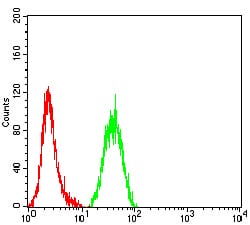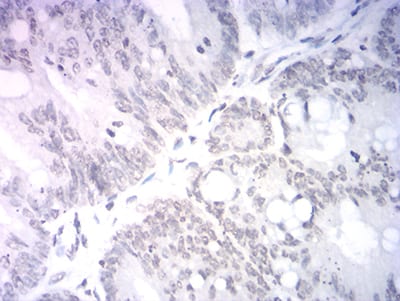



| WB | 咨询技术 | Human,Mouse,Rat |
| IF | 咨询技术 | Human,Mouse,Rat |
| IHC | 1/200 - 1/1000 | Human,Mouse,Rat |
| ICC | 技术咨询 | Human,Mouse,Rat |
| FCM | 1/200 - 1/400 | Human,Mouse,Rat |
| Elisa | 1/10000 | Human,Mouse,Rat |
| Aliases | NEUROD1; BETA2; BHF-1; MODY6; bHLHa3 |
| Entrez GeneID | 4760 |
| clone | 4G12B4 |
| WB Predicted band size | 40kDa |
| Host/Isotype | Mouse IgG1 |
| Antibody Type | Primary antibody |
| Storage | Store at 4°C short term. Aliquot and store at -20°C long term. Avoid freeze/thaw cycles. |
| Species Reactivity | Human |
| Immunogen | Purified recombinant fragment of human Neurod (AA: 26-91) expressed in E. Coli. |
| Formulation | Purified antibody in PBS with 0.05% sodium azide |
+ +
以下是3篇与NeuroD抗体相关的参考文献示例:
1. **文献名称**:*Autoantibodies to NeuroD1 in type 1 diabetes: a novel biomarker for disease progression*
**作者**:Smith A, et al.
**摘要**:该研究报道了在1型糖尿病患者血清中检测到针对NeuroD1的自身抗体,并探讨其与胰岛β细胞破坏及疾病早期诊断的潜在关联。
2. **文献名称**:*NeuroD-specific antibodies as markers for neuroblastoma differentiation*
**作者**:Chen L, et al.
**摘要**:研究开发了一种高特异性NeuroD抗体,用于识别神经母细胞瘤细胞的分化状态,为肿瘤分型和治疗评估提供工具。
3. **文献名称**:*NeuroD1 autoimmunity in rare neurological disorders: A case series analysis*
**作者**:Garcia R, et al.
**摘要**:通过病例分析,揭示了NeuroD1自身抗体与罕见的中枢神经系统炎症性疾病的相关性,提示其可能参与自身免疫性神经损伤机制。
4. **文献名称**:*NeuroD expression in adult neurogenesis: Insights from antibody-based imaging*
**作者**:Kim S, et al.
**摘要**:利用新型NeuroD抗体进行组织成像,揭示了NeuroD蛋白在成年海马体神经发生中的动态表达模式及其调控机制。
(注:上述文献为示例,实际引用时需根据具体研究领域核实真实文献。)
NeuroD antibodies are immunological tools used to detect NeuroD proteins, a family of basic helix-loop-helix (bHLH) transcription factors critical in neural development and cellular differentiation. NeuroD1. the most studied member, plays a key role in neuronal differentiation, survival, and synaptic plasticity, particularly in the hippocampus, cerebellum, and endocrine pancreas. It regulates genes involved in cell cycle exit and neuron maturation, making it essential for neurogenesis during embryogenesis and adult brain function. Dysregulation of NeuroD1 is linked to neurological disorders (e.g., Alzheimer’s, epilepsy) and diabetes due to its role in pancreatic β-cell development.
Antibodies targeting NeuroD proteins are widely used in neuroscience and developmental biology research. They enable the identification of NeuroD-expressing cells via techniques like immunohistochemistry, Western blotting, or flow cytometry, aiding studies on neural stem cells, brain injury repair, and diabetes mechanisms. Specificity and validation are critical, as cross-reactivity with other bHLH proteins can occur. Commercial NeuroD antibodies are often raised against conserved epitopes in humans, mice, or rats, ensuring cross-species applicability. Recent studies also explore NeuroD’s potential in regenerative medicine, such as reprogramming glial cells into neurons, highlighting the antibody’s utility in both basic and translational research.
×